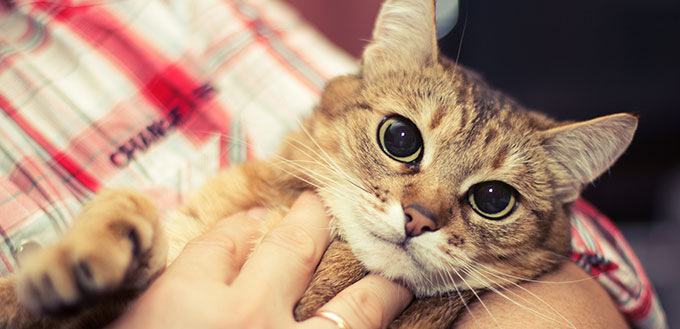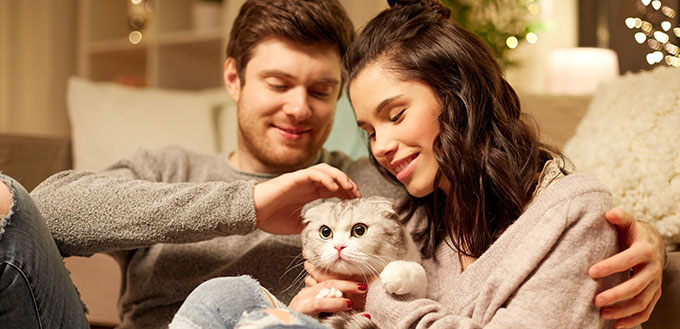Anyone who lives with a cat will have observed behavior that looks an awful lot like jealousy. You may have been petting one of your cats when another has come along and tried to join in only to be batted away by the cat that was originally enjoying the cuddle! You may even have noticed that puss looks very put out if you pay attention to your friend when they come over to your house for a coffee. But do cats get jealous of each other or of other humans?
Do Our Cats Feel Jealousy?
There is no consensus of opinion amongst experts about whether cats actually experience envy. Some feel that when you see cats behaving in an assertive or pushy way, they are simply acting according to a social hierarchy. If they feel that their social status is above another cat, or even above a human, they will show that. Others interpret this feline behavior as a desire to get their owner’s attention rather than a feeling of envy towards another animal or person.
Jealous behaviors can also have their roots in a cat’s desire to defend what they perceive to be theirs and in their territorial nature. In the wild, cats would have competed for resources including shelter, food and water. Also, male cats competed for the attention of female cats and females defended their territory where they were raising their kittens. Other cats were not welcome to share and whilst this is not strictly speaking jealousy, it amounts to the same thing.
What does Cat Jealousy Look Like?
There are several signs that your cat feels jealous. Whether you agree that this emotion is actually jealousy or not, the following are signs that your cat is unhappy and this means that you need to do something about it.
- Showing signs of aggression
Aggression is a tell-tale sign of cat jealousy and possessiveness. It can show itself as biting, nibbling and scratching. The aggression is aimed at the animal or human that is getting the attention that they think they should be having. This can be a problem if you have an older cat and introduce a young kitten into your home.
It can also manifest as what animal behaviorists call ‘pushy behavior’ which means that they try to stop another cat from moving around the home as they wish or they impose themselves on you when you are trying to give another pet some love.
In a multi-pet household, you may notice your cat growling and hissing at another pet or getting into a physical fight with them.
- Changes in toilet habits
Cats often show that they are unhappy with inappropriate toilet habits. Instead of using their litter tray as they used to, you may find that they take a pee or poop in the middle of the rug. When cats get jealous you may also find little ‘accidents’ on your personal items such as laundry or bed sheets. This is a sure sign that your kitty is feeling a little envious about something! If you have a new pet in the home, it could be a protest that they are being forced to share their humans and their territory.
- Interacting with other pets and humans
A jealous cat may start to show a lot of attention to their human owner. They may start to sit on your lap, cuddle up to you when you are trying to work or even lick your face or hand. They may go and get a favorite toy and bring it to you in an attempt to get you to play with them. They may even try a trick that they know always makes you laugh. This can be a nuisance as cats are very good at invading your personal space. They will lie across a lap top keyboard, sit on your important papers and knock a fragile object off your desk just to get you to pet them.
A less common sign of jealously is for your cat to withdraw and spend more time by themselves. They may go out of the house or choose to spend time in another room.
What Causes Cats to Be Jealous?
Most animal experts agree that this type of behavior is exhibited by cats that are bored or who want some extra attention from their owners. Cats can feel very insecure and need reassurance from their human family. They like to be petted and cuddled and they like the humans of the house to play games with them. They do not like to have to share that special time with another pet or human.
It can also be caused by a competition for resources. This could be over a tasty snack or a special cat toy and is most often seen in houses that have multiple pets. Stress, a lack of space and a lack of exercise can make the situation worse. However, some cats are just genetically more prone to act in this way than others in the same way as humans have different personalities.
What you Can Do About Jealous Behavior in Cats
Act quickly – the sooner you nip this in the bud the better. Here are a few things that you can try.
- Observe your cat closely
Watch your kitty over a couple of weeks. Make a note of any occasions where they showed aggression or other signs of jealousy and also record what may have triggered it. A new pet is an obvious example. You may see a pattern emerging.
- Be careful how you pay pets attention
Do not have a favorite cat. When you pay one cat some attention, make sure that you go and pet the others as well. If you have other pets such as dogs, make sure that you divide your time between all of them. The same is true for new people in your life – especially if your kitty is used to having you all to themselves.
- Provide plenty of resources
If there are plenty of resources then there are fewer things to get jealous about. Make sure that there is plenty of water and food and that each cat has their own bowl. Provide plenty of toys, sleeping areas, scratch pads and anything else that cats do not like to share.
You May Also Like: Cat Scratching Pads and Cat Beds
The Final Word…
You may or may not agree that cats can get jealous but they can certainly show behavior that indicates that they are unhappy. As a responsible owner, it is your job to find out what is causing it and use your own behavior and resources to make your kitty feel better. Don’t forget that there are some times when this is most likely to be an issue and the arrival of a new pet in the home is one of them.









